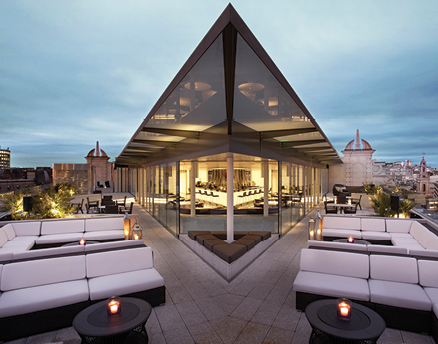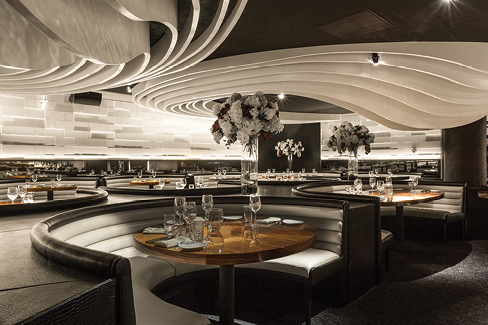- Home
- Media Kit
- Current Issue
- Past Issues
- Ad Specs-Submission
- Ad Print Settings
- Reprints (PDF)
- Photo Specifications (PDF)
- Contact Us

![]()
ONLINE

Creating Experiences
Editors’ Note
Jonathan Segal has over 35 years of experience working for family owned hospitality companies, including The Modern Group. With his father, he created The International Travel Group in 1991, a successful merger of two hotel booking companies, Expotel Hotel Reservations and Room Center. In addition, he was also the Co-Creator of WorldPay, the world’s first Internet payment company and the predecessor to PayPal.
Company Brief
The ONE Group (togrp.com) develops and operates upscale, high-energy restaurants and lounges, and provides ONE Hospitality, a turnkey food and beverage service for hospitality venues including hotels, casinos, and other high-end locations, both nationally and internationally. The ONE Group’s primary restaurant brand is STK, a unique steakhouse concept with locations in major metropolitan cities throughout the U.S. and Europe. STK artfully blends two concepts – the modern steakhouse and a chic lounge – into one, offering a high-energy, fine-dining experience with the superior quality of a traditional steakhouse.

Radio Rooftop bar at the ME London Hotel
Will you discuss where the STK brand stands today and are there additional opportunities for growth?
STK has grown fantastically. By the end of 2017, we will have 25 STK locations, including five STK Rooftops, which offer a different experience from our traditional STK venues.
The brand has retained a high degree of strength because of the target market we go after. The guys are in their late 30s/early 40s and up, and women are in their mid-20s and up. We’re appealing to a market of people that would go to two or three different places a night. Because we’re catering to a market that is less influenced by the current trend and more influenced by what counts for this group as an enjoyable experience, it enables the brand to sustain itself.
Our oldest STK is 10 years old now and, for the past four years, it has been among the top 100 hottest restaurants in America.

STK Chicago
How do you maintain consistency as the growth continues?
Seventy percent of the menu is staple so it will be the same at every STK around the world; 30 percent is locally created, so we have a high degree of control over the staple dishes.
The dishes that may fluctuate are the specials that come about in a specific location. The public is a good gauge of consistency. We live in a world where everyone is an experienced food critic and the opinions of traditional food critics aren’t considered as much.
I just need to wake up in the morning and read the summary of the reviews from the night before by those who have taken to social media and I get a good idea about my consistency.
Are there certain markets around the world where you feel there needs to be an STK?
Most of the STKs we’ll do now will be in leased and managed deals. We already have an STK in most of the major cities in America where we want to own.
There are many cities that could take an STK where we would certainly work on a license or management deal. This is not because we don’t believe they will be successful but because we have to reserve our capital for some of the major international cities where we want to have our own venues. Outside of that, we’ll lease and manage.
STK is to steak what Hard Rock is to a burger, so we really can put an STK anywhere.
How important is it to build awareness for The ONE Group?
The company is split into two divisions: the restaurant division principally has one brand, which is STK; we then have the hotel hospitality division where we go into hotels and take over their entire food and beverage operation. Within that division, we have a number of different restaurant brands that we operate for our hotel partners under the ONE Hospitality name. In that regard, they’re equally as important.
With all of the success you’ve had with STK, do you see growth on the hospitality side as well?
There’s huge opportunity. Our target market is deluxe four-star boutique, possibly junior five-star properties, and those exist in every major city in the world.
The limitation of our expansion on that program is how many we would do in a city.
If we can’t add value, there is no point in doing the deal. We can move traffic around our own venues, but if we try to take on too many opportunities in a smaller city, that won’t work for our partners.
When there is so much buzz around the entertainment and the scene at your venues, does the message about the quality of the food get lost?
We don’t sell ourselves on our food because the public expects to have a great meal when they go to a restaurant.
We sell ourselves on offering a great night out, which is important because people today want more from their experience.
How critical is it to continue to find top talent?
It’s becoming more difficult to get good people in the hospitality business. People are less attracted to the hospitality world than they once were.
Is it more challenging to maintain culture once you get to 25 restaurants?
We have to stop and reset, which is what we’re doing now as a company. We need infrastructure to grow but sometimes our infrastructure grows faster than our business. Every now and then, any business needs to go through consolidation as well as expansion.
The reason to consolidate is to recoup our strength.
Is there a balance between long-term investment and short-term profit?
It’s the price one pays to be a public company. We do live quarter to quarter, but the trouble with that is that strategy is often impaired. We have to do the right thing for shareholders and we may have a good idea of what is right for them, but it might require a two- or three-year strategy.
What makes this business so exciting for you?
I’m excited today by both the opportunities and the challenges. We’ve found that a recession is a great time to expand a company to be ready for the turn.•